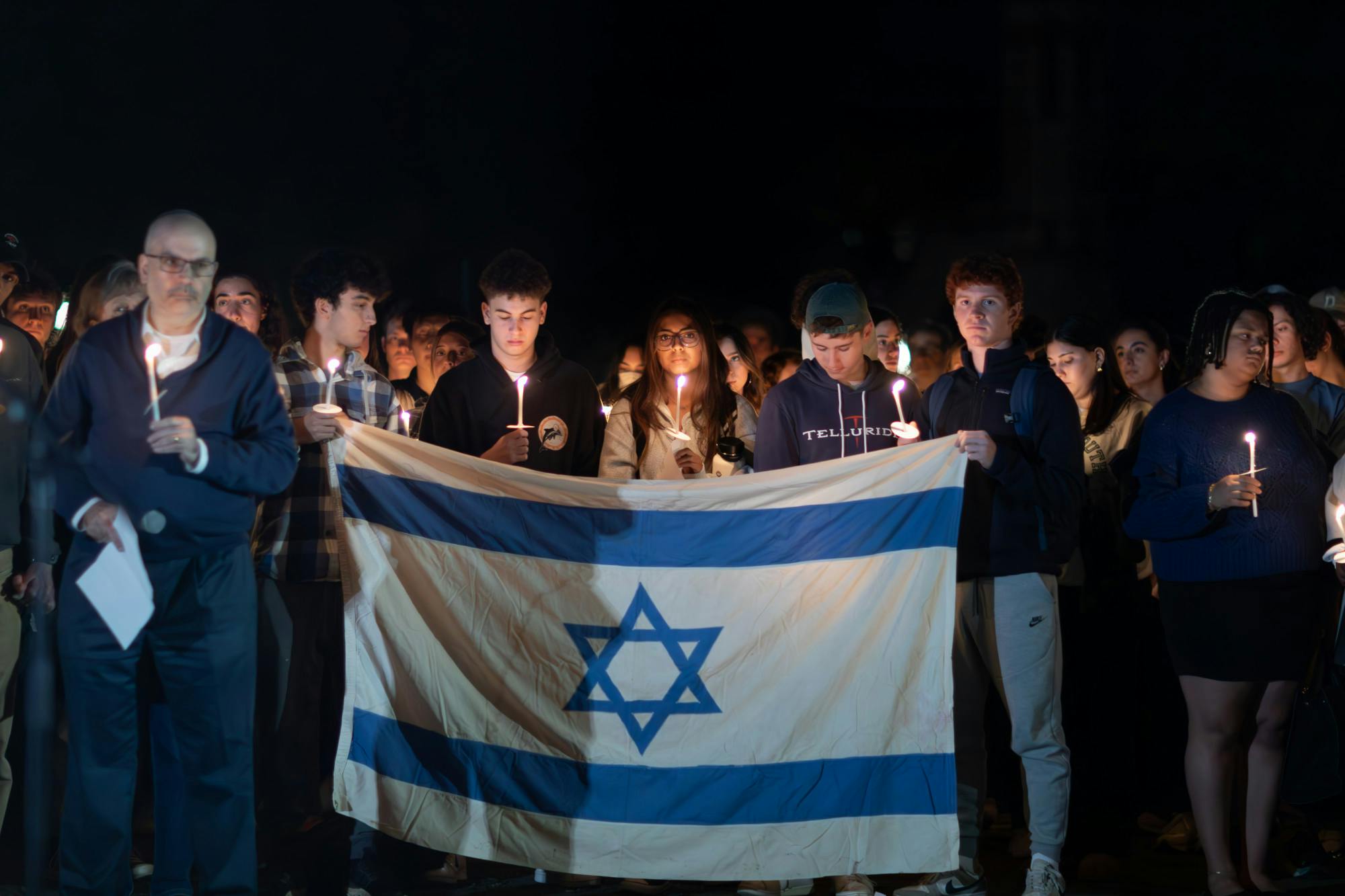On Oct. 12, students and members of the Dartmouth and Hanover communities attended a candlelight vigil on the Green co-hosted by the Rohr Chabad Center at Dartmouth and Hillel at Dartmouth in remembrance and support of those affected by the violence in the Israel-Hamas War.
According to Hanover Police captain James Martin, around 250 people attended the vigil, which was open to all members of surrounding communities.
In an interview before the vigil, Hillel co-vice president of religion Jonas Rosenthal ’25 explained that in the days since Hamas’s Oct. 7 terrorist attack on Israel, emotions within the College’s Jewish community had “run the gamut.”
“Shock, sadness, anger, fear, resignation, terror: Anything you can imagine, there are people here feeling [it] right now,” he said.
Also in an interview before the event, Hillel president Grace Dean-Saadati ’24, said that she felt “isolated” and “in a bubble” with respect to the conflict.
“I feel like I’ve been floating around, and the rest of campus is in a different universe,” Dean-Saadati said. “I hope this helps the rest of campus see the real impact this has had on our community.”
Sami Lofman ’24 and Hannah Brooks ’26 opened the ceremony by performing “Eli, Eli (A Walk to Caesarea),” a poem written by Hungarian-Jewish resistance fighter Hannah Szenes in 1942 and often performed on Holocaust Remembrance Day. Following the poem, Dean-Saadati spoke about the importance of the vigil.
“The Exodus story of our oppression is not a historical blip, but a ubiquitous reality,” Dean-Saadati said. “In this moment as a community, we stand on that narrow bridge with courage, resilience and determination, bolstered by the support of each other and united by the unshakeable belief that justice and peace will prevail in the land of our biblical ancestry.”
Chabad president Isaac Schildkraut ’24 echoed Dean-Saadati’s sentiments, adding that the vigil was “about us gathering as a community in solidarity for all the lives brutally and tragically murdered.”
Schildkraut reflected that “the butchering of children, the raping of women and the parading of dead bodies” had “cut straight to the depths of our soul.”
“We are left behind in a wave of violence, feeling raw and jagged, but we are not alone. All of us together here, every single person, reveals our inner power and strength,” he said.
Director Rev. Nancy Vogele ’85 recited from Psalms 23 and 27 and emphasized “the preciousness of human existence.” She added that “empathy, even with those whose views differ from ours, is the key to creating social bonds that nurture us all.”
College President Sian Leah Beilock then spoke about the College’s advocacy for community and empathy.
“We need … communal spirit to lend a special hand to those who have been touched directly by this war and those who are suffering in its shadow,” Beilock said. “My heart goes out to you and it grieves for you. I feel what you feel. I get it. I am here for you. The Dartmouth community is here for you.”
Beilock explained the need to “guard against antisemitism” and “make [Dartmouth] a place where our Jewish friends and community members feel really, truly safe. “
After the vigil, Rosenthal spoke about the importance of Beilock’s support for the Jewish community, calling her speech “emotional” and explaining that she had flown back to Hanover earlier than planned to attend the vigil.
“It really means a lot,” he said.
Lihi Dadon, an undergraduate exchange student from the Hebrew University of Jerusalem who is from Israel, spoke about her experience serving as a military commander in the combat surveillance unit of the IDF.
“I served in a small outpost near Gaza, about 3,000 feet away from the border … [Hamas] infiltrated the outpost where I served, where I lived for two years,” Dadon said. “My brother was released from service three months ago. He also served where I served.”
Dadon expressed the tragic personal impact that Hamas’s recent terrorist attacks against Israel had had on her.
“I wasn’t there when Hamas launched the attack,” she said. “My brother wasn’t there when Hamas launched the attack. But many others were. One of our relatives and friends was. Dekal Suissa. Remember his name.”
Mia Steinberg ’25 gave concluding remarks to the vigil in which she thanked attendees and noted “the warmth and love of the community.” The vigil ended with a performance of “Hatvikah,” the Israeli national anthem, sung by Brooks and Lofman.
Following the vigil, Upper Valley Jewish community president Roberta Berner said that the event was “really wonderful,” and that “it felt very good to be among people who were here in sympathy and understanding.” She noted that many Jewish people at the College and in the Upper Valley were directly tied to the conflict through their relatives.
“We have members who have sons, daughters, brothers, sisters, grandchildren in Israel, and our thoughts are with them.”
Lofman said that “the support was very much appreciated by the Jewish community here on campus.” She added that “the amount of people that showed up truly meant a lot.”
“We had support from all different corners of campus, and seeing that solidarity was really important,” she said.




